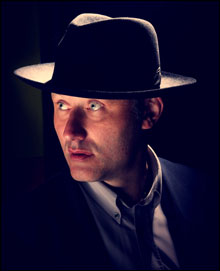 What the hell happened to ambient music?
What the hell happened to ambient music?
Somewhere over the past decade, the subtle but breathtaking minimalist style of soundscapes invented and perfected by Brian Eno on albums like Music for Airports and Music for Films (both recently reissued on Virgin) lost its soothing, brain-stimulating character and became electro-clatter.
Until that transformation, ambient music had been wallpaper for the chill room, not aural ecstasy for the dance floor. One of the style’s original joys was that its volume was low enough, its melodies laid-back enough, its rhythms organic enough that listeners could define its purpose: music to sway to, to sleep to, to meditate with, to fixate on, to clean house or work to, to use to set the mind on its own free-ranging journeys. That’s impossible when ambient music gets recast as a hailstorm of beats.
A few canny musicians, however, understand how to balance the beat and the beatific. Jah Wobble, the British bassist with punk-rock and dub roots, is among them. Wobble, who brings his seven-piece band to the Middle East this Friday, is a torchbearer for the notion of ambient music as manna and medicine.
His new Mu (Trojan/Sanctuary) takes the slow, heatbeat-like percolation of Caribbean dub and slows it down even farther, until the music’s barely breathing and long, gentle melodies and other layers of sound — often creating a quilt of harmony — emerge and creep into the listener’s soul. If the soul’s willing, that is. Wobble himself is a willing soul indeed.
“No matter what you do in music, you are like a warrior and you have to put yourself in the right mind set,” the bassist — who once played alongside his old college chum the Sex Pistols’ Johnny Rotten as a charter member of Public Image Limited — explains over the phone from England. “I meditate, and you don’t just meditate when you’re in the mood or feel good. You also meditate when you’re not feeling well and don’t want to, because that’s an important part of staying in tune with its strength and with yourself.
“The music I make has a meditative quality. When I play, it relieves pain. I’ve got a very active mind that sometimes tortures me and can get me into a lot of problems in life. When I play music, I’ve found that my confused mind calms down. I’ve found that if I pick up the bass and start to explore, it will absorb the craziness and my mind will quiet — and I hope that Mu has a similar effect on others.”
Like the mythic lost continent of Mu, where godlike residents wore clothing made in part from stardust and lived in a kind of supernatural utopia before its lands were swallowed by the Pacific Ocean, Wobble’s new CD is full of mysteries. Carefully woven into its 10 slowly unraveling songs are voices, horns, electronic keyboards and samples, guitars, and ideas about love, survival, and spirituality that capture a little piece of human stillness — that centering place within everyone that our busy schedules and the constant bombardment of our market-driven culture can numb or destroy.
“I might be tensed up before a show, and during soundcheck I’ll be doing very fast tricky little bass lines — bursting with energy,” Wobble continues. “Then the music will start to take hold and calm me down into a more mid-tempo vibe. To me, this music represents the big mind, the greater mind, the cosmic mind, if you like. And that mind is there all the time. It never goes away no matter how shitty you might be feeling. The overall reality is that within your little, relative self, that big self — the generous, spiritual core of your being — never really goes away.” Zen dub, a term Wobble has used to describe his ambient work when pressed to do so, seems a fitting tag.
There are parallels in other, earlier types of music. Miles Davis’s slow, breathing masterpiece Kind of Blue (Columbia) is an album everyone — regardless of musical preferences — should own. Hard-assed as Miles could be, the spare, warm compositions on Kind of Blue touch listeners’ “bigger selves” as the gentle, modal harmonies unfurl in sheets and textures comparable to the ambient work of Eno and Wobble. One could even make an argument for the album as the first true ambient recording, since it swings with unhurried gentility and grace.
It’s no surprise that Davis’s music has inspired Wobble. “I listen to composers who are very modal,” he allows. “Most of my bass lines are in very fixed modes. There’s something about that approach I find calming and centering.